Audrey's childhood in Kerikeri
(Chap. 1)
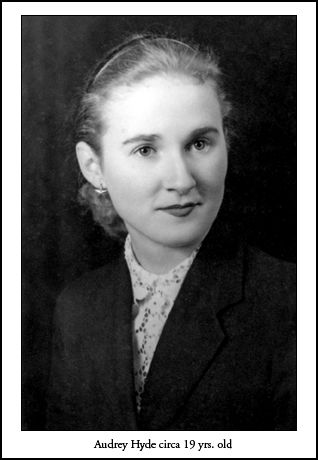
Audrey's childhood in Kerikeri
|
|
JOAN HYDE'S ELDEST DAUGHTER, AUDREY,
STORY OF HER CHILDHOOD IN KERIKERI
Chap. 2: Coolalie & Twins Chap. 3: Dad's Army Chap. 4: Early School Days Chap. 5: N.Z. Friends School Chap: 6: Rivervale School and Pony Club Chap. 7: Marist Convent Chap. 8: Northland College Appendix I: David on "Life in Kerikeri" Appendix 2 - Coolalee's sale tender document Index for this page:
Our Father and Mother, Graham and Joan Hyde, came to New Zealand in 1934. They met in England in the summer of 1932, after Mum had been on holiday in Cannes on the French Riviera. At Cannes she met Dad’s sister Gwendolyn, who asked her to take a parcel back to England for her brother and her mother, and that was the start of the romance between our parents. Dad had lived in Australia since the age of 14 and gone to war with the Anzacs but by the late 1920’s the depression started to bite, so much so, that he had to walk off the apple orchards he owned in Pakenham, and return to England. He was only getting 1/6 (1 shilling and sixpence) for a bushel box of apples and it was costing him approximately 4/- (4 shillings) per box to send out, so the maths did not add up, hence why he had to walk away. He lost everything. At the time he owned a beautiful collie dog called Dale but when he left for England he couldn’t take the dog with him so gave him to a friend. However Dale pined for Dad and died a few weeks later which was more upsetting for Dad than losing the orchard. 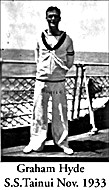
Mum’s Aunt Winifred disliked Dad, and disapproved of the relationship so much that towards the end of 1932, at her own expense, she paid for Dad to go back to Australia with high hopes that her niece would forget all about him. He went back to Melbourne and found a job in a Texaco service station ; heaving around heavy petrol drums from whence he filled up cars with a lever type connection attached to the drums. It was tough work but at least he had a job in those hard times, because many didn’t. 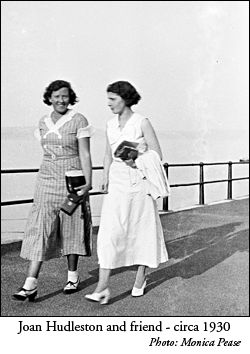
Mum did not forget Dad, and against her family’s wishes, she travelled to Australia in 1934, and married him at the Register Office, in Melbourne, on August 8th 1934. Just before the marriage Winifred’s daughter Monica, who was like a sister to Mum, wrote to her in Melbourne and implored her not to marry him and she asked her to get onto the next boat headed towards England. Unfortunately, Mum didn’t hide the letter properly and he found it. He was furious and told her Monica would never be welcome in his house! It would be another 50 years before she saw Monica again. The day they married, Dad was offered a job as an announcer in Melbourne’s new radio station, but he had to turn it down, because the next day they were booked to go to N.Z. on the ship, the S.S.Tainui. 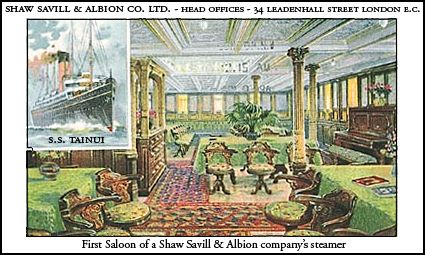
The trip to New Zealand was to be their honeymoon but it was a disaster from the start. Once on board they found the ship only had single sex cabins so Mum landed up with three other ladies in a four berth cabin, at one end of the ship, and Dad had a cabin with three other men, at the other end. The boat was headed for Auckland but due to a major Watersiders strike in the city, the Tainui had to dock in Wellington. From Wellington they boarded the overnight steam-train to Auckland which took about 14 hours to cover the 450 miles. This train was called the Limited and when David and I were sent to boarding school in Wanganui in later years, we were to get to know this train very well, but more of that in another chapter. 2. Auckland & Royal CourtThey had no idea of what their future would be in N.Z. or where to settle down. I have never really found out why they came to New Zealand because, in later years, Dad hated it over here and always talked about Australia. He had been in New Zealand for a month or two with his cousin Noel Armitage in 1934, before Mum arrived in Australia, but he didn’t learn very much about the country. Once in Auckland they found accommodation at a guest house called ‘Royal Court’ which was owned and run by an unforgettable lady called Dolly Farquar whom everyone called Aunt Dolly. Aunt Dolly’s great love was racing and in the kitchen the radio seemed to be permanently on the races. I think Aunt Dolly had something to do with the Auckland Racing Club. She was a very gregarious lady and took in a great assortment of people, many of them actors or artists. We often stayed there as children, and one of her permanent guests was a lady who was definitely down on her luck, but in spite of that, she would dress up in all her finery and pile her hair on her head, and thread strings of pearls through her hair every day. She looked very stern, but grand, to us children, and we were sure she was Queen Mary, hence we called her that! Royal Court had a huge kitchen with a large wooden ‘farm’ table in it. We would have our meals there while Mum and Dad enjoyed their meal with the guests in the dining room. We didn’t mind because we loved staying there and Aunt Dolly would have her meals with us and make us laugh. She knew how to amuse children. At night I‘d often wake up to the sound of the clip clop of the hooves of the milkman’s horse, as they did their early morning rounds, delivering milk along the Streets. It was a soothing sound and one felt that everything was right with the world. 3. Taking up residence in Kerikeri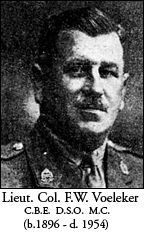
About three weeks into their stay at Royal Court, owing to the Depression still being in full swing, Dad found it very difficult to find any kind of work in Auckland but a Stewart Johnson came to stay at Royal Court and this chance meeting was to change their lives. He told them of the possibilities of the new citrus industry being started in Keri Keri and suggested they think about it but in the meantime, if Dad would like a job in Keri Keri, there was one going at Colonel Voelker’s orchard at Shropshire Farm, on the Keri Keri Inlet road, and would entail looking after tung oil trees. Dad didn’t know anything about tung oil but the offer was too good to let go so they packed their bags and set off, by train, to the nearest station which was Otiria where Stewart picked them up and drove them the 20 miles to their first home in New Zealand. Mum was shocked! She had been brought up in gracious homes, in England, and was very used to all the mod cons, but here, she was faced with a one roomed corrugated iron hut containing a wood stove at one end; a bed at the other, and the loo was a pit in a lean-to outside. They had no electricity and all the water was bucketed up from the nearby creek. The wood stove was a curse in the summer, because of the heat, but a blessing in the winter. She did the washing in the creek and although it was tough for Mum to start with, she persevered and made a little home while Dad learned all about tung oil and the Colonel seemed pleased with his work. They christened their one roomed batch, ‘Hell Hovel!’ 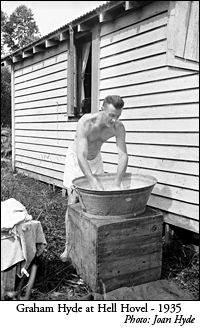
The tung oil tree produces nuts from which oil is extracted, and at that time, was used as one of the ingredients of ‘Indian Ink’. It was also used for paint and waterproof coatings and as a component for caulk and mortar. Some woodworkers consider tung oil to be one of the best natural finishes for wood. Many of the orchards, in Keri Keri, grew tung oil but I don’t think it was very profitable, so by the time war started, most orchards had converted to citrus fruit, but I do remember, when I was about three, accompanying Dad to Colonel Voelker’s and playing on the ground under the trees while Dad worked. He continued working there until his own citrus orchard started bearing fruit. 4. Kerikeri in the 1930's and 40's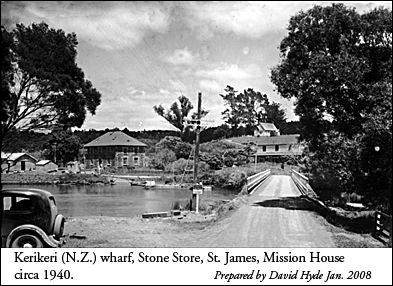
Keri Keri, and environs in those days, had a total population of about 500 people mainly made up, apart from the local Maori population, of English descent and many came from either China or India and were reasonably well-off. Colonel Voelker was in the Indian Army and he met his wife Nora, while serving there. When they came to New Zealand he joined the N.Z. Army and during the war, if I remember rightly, he was in charge of the N.Z. Army in the South Pacific. He died at a relatively young age but Nora lived on, in Keri Keri, for many years. They had two daughters; Joan and Barbara. David and I had our 7th birthday at Shropshire Farm, because although Barbara was a couple of years older than us, she also had her birthday on the same date, and so ours was combined with hers in their lovely old home. I remember the house was green and it had a large veranda. Someone gave me a present of some talcum powder. I had never seen anything like that before, and was fascinated with it, but I had absolutely no idea what one used it for! I turned the top and shook it hard, like a pepper pot, and the powder went everywhere; much to the consternation of Mum. 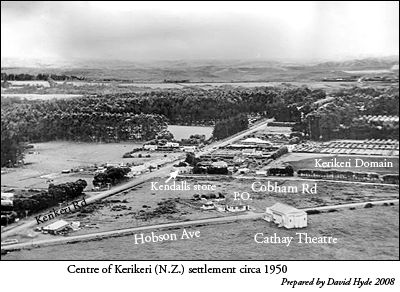
The village of Keri Keri in the late 30’s early 40’s, consisted of two grocery cum haberdashery stores, Smellies and Kendal’s; Mr Jo Yendal had the bakery where he made the most delicious pies and bread; the butcher shop was run by a Mr Smith and later Mr Davidson; the drapery store was owned and run by Mr Rowson, whose daughter Marlene attended Northland College with Julia and myself, in later years, and Mrs Brookwhite ran a small bookshop cum library. Alec Smellie delivered groceries to our house every Thursday, and Jas Kendal would deliver on Fridays. The meat and bread came via the mail van so in many ways the services were far better in those days, than in this modern world, although the N.Z. Herald was always a day or two late. Mr Blackwell, commonly known as Blackie, owned the garage where the little green beetle (our car) would visit occasionally, and Dad, being the type of man he was, would stand over and dictate to a very patient Blackie what to do, much to the awful embarrassment of we three in the car. I can remember many a time wanting to get under the car and hide! Mr Bus Emmanuel had the Cathay picture theatre which was opposite the post office in Hobson St. The pictures were shown on Wednesdays and Saturdays and it was here that the class system really showed itself, in my eyes. Once or twice a year we went to the cinema. It was a major event in our lives and the films, our parents allowed us to attend, were usually Laurel and Hardy or the Marx Brothers. There was an upstairs and a downstairs within the theatre, and we always sat upstairs because that was where the ‘gentle folk’ sat. The ladies would arrive in their fur coats escorted by husbands, impeccably dressed, and many had year round reserved seats and god help anyone if they sat in those seats even if they didn’t attend the cinema! God save the King was played before the movie started and everyone stood up while the anthem rung out, and this gave Julia and I the ideal opportunity to scan the downstairs audience, and espy which of our school friends were seeing the film. We did not dare acknowledge them because we knew Father would not approve, particularly as some of them were Maori! In the early 50s, I asked father if I could sit downstairs with my school friends. The prompt answer was “No, only the riff-raff sit down there!” I was most embarrassed and prayed that no one heard him! When we came home, from the pictures, Mum would make toast topped with dripping, left over from the Sunday roast. My favourite was beef dripping and pork dripping came a close second. It certainly didn’t do us any harm, unlike today’s ‘treats’, because not one of us became obese. 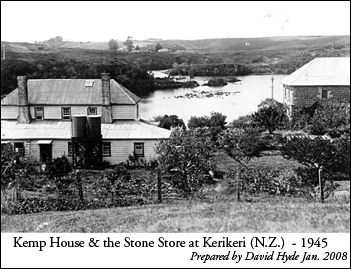
Mum had a legacy left to her from her father, and another rather large one from her Aunt Alice, who had died a few years before, and had saved money from her job which entailed travelling around England visiting Department stores and demonstrating embroidery. Before she went to Australia, she had a reasonable amount of money, whereas, Dad had nothing owing to the loss of his apple orchard in Pakenham. |
|
|
|
|
|